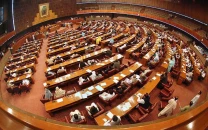FBR chief softens stance on new revenue authority
Shabbar Zaid agrees to take input from all stakeholders after officials caution him of implications

Representational image. PHOTO: REUTERS
Zaidi showed flexibility after he could not win support from within the tax machinery during the two days of deliberations at the forum of Chief Commissioners of Inland Revenue (CCIR) conference. The FBR’s Inland Revenue Service, which is severely affected by the government’s decision to replace the FBR with Pakistan Revenue Authority (PRA), strongly opposed the arbitrary decision.
Prime Minister Imran Khan had approved a plan for restructuring the FBR in an interim period and then setting up PRA in the next eight months. “I thank all the CCIR of IRS for a very productive meeting. Restructuring/transformation of FBR will be undertaken after taking into account feedback of all the stakeholders. Whole organisation including all levels of staff will be taken into consideration,” Zaidi tweeted at the end of the two-day conference.
His brief announcement is expected to soothe nerves of the 16,000 IRS workforce, who were contemplating to either go on strike or adopt a go-slow policy against the decision of the government. Any of the planned two actions would have further dented the FBR’s revenues that have already fallen below the four-month target by a whopping Rs167 billion.
However, the FBR’s top taxmen remained sceptical even after chairman’s assurance, as the PM’s decision to setup the PRA has not yet been withdrawn. The association of IRS officers is also expected to meet today (Wednesday) to chalk out future course of action. Heads of FBR’s 23 field formations, their members and other senior officers spoke against the government’s plan of setting up the PRA by June 2020.
The FBR’s top hierarchy raised questions about the legal mandate of the authority to collect taxes on behalf of the federal government, security of their service under the authority and abolition of grade-21 posts of chief commissioners. The FBR officers said that they were not against reforms but the way the government was trying to implement these was not acceptable to them.
IRS objections
The key objection by the IRS force was that the government made the plan to abolish FBR and set up PRA by not acknowledging the harsh ground realities. Their view was that the government should have first fully automated the system, digitised the economy and then assess the human resource and organisational structure of the tax machinery.
The reforms need to be properly sequenced and creation of the PRA has to be initiated and implemented first before undertaking any other reorganisation initiative, according to a presentation given to the FBR chairman on Tuesday.
The top hierarchy also objected to the timeline of setting up the PRA by June 2020 and sought revision of the deadline. One of the arguments that the FBR chairman gave in favour of the PRA was that it would be fully autonomous. The IRS officers were of the view that the FBR’s autonomy can be ensured by implementing the FBR Act of 2007 in letter and spirit.
The act ensures separation of the posts of FBR chairman and Revenue Division secretary. Either both charges remained with past chairmen or the Revenue Division’s secretary additional charge was given to finance secretary. The FBR Act has already addressed these areas in a comprehensive manner and empowers the FBR chairman to hire the staff. They demanded that the existing structure of FBR should not be revamped until the proposed PRA is put in place.
They warned that any change in structure at this time may lead to slippage in revenue targets, which the state cannot afford. The officers argued that repeated reshuffle of jurisdictions and records always turned out to be counterproductive.
The top taxmen also opposed the PM’s decision to appoint two deputy chairmen FBR for Inland Revenue and Customs. The government also wants to abolish grade-21 post of chief commissioner of IRS and to directly place 174 commissioners under member IRS North Operations and Member South operations.
The FBR officers were of the view that each member operation cannot handle 87 commissions. This will not only increase the work load but will also weaken checks and balances.
This newly approved organogram has to be revisited in terms of cadre strength of IRS and measurement of world on scientific basis, according to the IRS officers, objecting to abolishing grade-21 post.
They argued that international data may be taken into account while determining overall strength.
Where the government wants abolish 24 posts of IRS, it plans to give 38 additional grade 21 posts to the Customs Groups. The restructuring plan includes upgrade of grade 20 collector customs posts to grade 21. The IRS group objected to upgrading the post of the collector customs to 21.
The PM had also approved the post of Chief Information Management Officer (CIO) in place of the Member Information Technology. The IRS officers objected to abolishing the IT member post. On the PM’s decision to immediately establish a Tax Advisory Board and separate policy from FBR’s operations. The IRS officers were of the view that policy analysis wing needed to be retained in FBR for input and only one additional secretary should be placed in the Revenue Division as against two.
The PM conditionally approved to enhance FBR’s revenue collection charge from 0.65% to 1% over the next three to five years subject to collection performance. The IRS officers demanded that collection charge may be enhanced to 1.5% as a minimum before launch of PRA- transition phase requirements.
Published in The Express Tribune, November 6th, 2019.
Like Business on Facebook, follow @TribuneBiz on Twitter to stay informed and join in the conversation.



















COMMENTS
Comments are moderated and generally will be posted if they are on-topic and not abusive.
For more information, please see our Comments FAQ